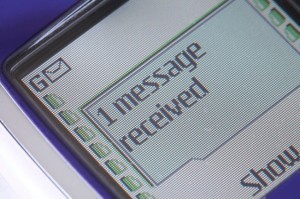 A high-tech diabetic safety service may soon use text messages to notify paramedics if a patient’s blood sugar levels dip too low. The program is being developed by researchers at Swansea University in Wales and scientists hope it reduce costs for the National Health Service in addition to saving the lives of diabetics.
A high-tech diabetic safety service may soon use text messages to notify paramedics if a patient’s blood sugar levels dip too low. The program is being developed by researchers at Swansea University in Wales and scientists hope it reduce costs for the National Health Service in addition to saving the lives of diabetics.
The team at Swansea has been working with various technology firms to create the new generation of blood glucose sensors, an important piece of equipment for diabetics.
The new project aims to develop a notification service that will notify family members or medical personnel via text message when a monitoring unit detects that the patient is experiencing dangerous blood glucose levels.
The monitoring unit would also streamline blood glucose testing for diabetics, making it easier and quicker for them to test their levels throughout the day. According to Dr. Vincent Teng, a nanoelectronics expert at the Swansea University College of Engineering, the testing system is both pain-free and non-invasive, unlike testing through other methods such as pricking fingers several times a day.
Dr. Teng stressed the importance of implementing a system that can notify health professionals or family members if diabetics faint and are unable to contact emergency services themselves. “Diabetic patients with low blood glucose can become unconscious due to hypoglycaemia and there are many reported incidents where patients who either live or work alone fainted, which can be fatal,” said Dr. Teng. “Therefore, a multi-functional monitoring system is important to manage the glucose level of diabetic patients and to provide warning when the patient is unconscious.”
The primary goal of the research project is to create a “low-cost continuous monitoring system” that integrates blood glucose sensors and mobile networks to ensure that diabetics are never stuck in a situation where their glucose levels drop to dangerous levels but are unable to alert anyone. The project cost £470,000 and was funded by the Welsh Government’s Academic Expertise for Business program, which is backed by the European Union.
The monitoring system would utilize micro-needles, each measuring less than a millimeter in size, that take blood samples from the dermal skin. Utilizing a combination of nanotechnology and wireless communications technology, the system would gather readings and transmit the results to cell phones and then to the National Health Service, passing on the data to the physicians taking care of the patient.
Blood glucose monitoring is important to diabetics for several reasons. Not only does it alert diabetics to possible dangerous blood glucose levels, but it establishes trends in glucose levels that can help diabetics plan their meal and exercise schedules and determine when to take medication. Treatment for dangerous blood glucose levels may include insulin or dietary supplements.
Officials involved in the project say that the system won’t only be useful for diabetics. Once proven effective, it can be adapted to provide monitoring and notification services for patients of other chronic diseases, such as cancer, asthma, and heart disease.
The Welsh Government’s Academic Expertise for Business program funded the project. The program uses European Union convergence funding to work with Wales’ academic institutions, utilizing their knowledge, facilities and expertise to promote positive economic gains for Wales. Also known as A4B, the Academic Expertise for Business program will last six years and will provide £70 million in total funding for partnerships between higher and further learning institutions and the business community.